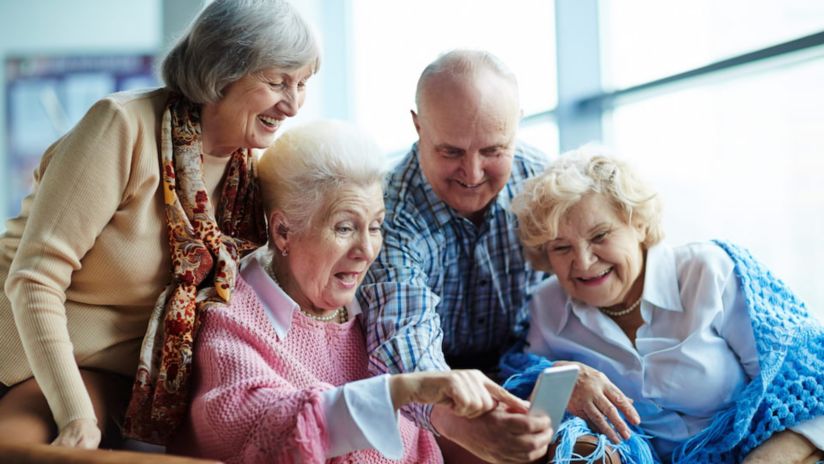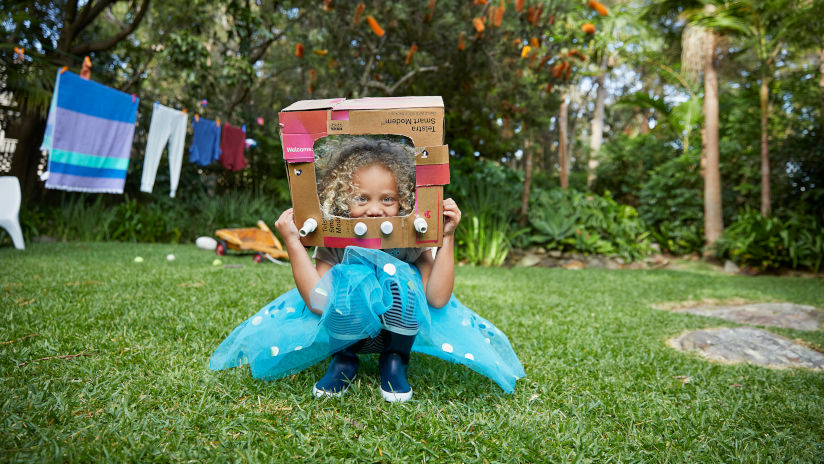Never too old: how thousands of seniors are discovering the joy of the internet
They are things that the vast majority of tech users take for granted: the opportunity to buy some clothes, check your bank balance, watch a movie, chat with an old friend overseas. But for many older Australians – isolated, uncertain, in need of these online services more than anyone – these everyday tasks are simply not accessible to them.

This article was written by Ralph Johnstone in collaboration with the Telstra Sustainability team.
Suvarna Patel cannot remember life before WhatsApp and FaceTime and Zoom. It may only have been a few years ago, but for the 80-year-old widow, the social apps have been a “complete lifesaver” – particularly during the COVID lockdowns.
“I live with two adult grandchildren so I’m lucky that I’m not alone,” says Suvarna. “But they don’t always have time to explain to me how things work online – or they go so fast, I have to ask them to repeat themselves three times!”
In 2015, Suvarna discovered one of the first Tech Savvy Seniors programs to be delivered in Hindi at Sydney’s Wentworth Library. She has since done “at least one course” of eight sessions each year – learning about everything from texting and emails, to online searches, cyber-safety, shopping, social media, translation services, and video chats. “During COVID, I started attending yoga and meditation classes online. I was speaking with my brothers and sisters in India every week. I found new restaurants in my neighbourhood. I don’t do online banking yet – that’s still a bit scary – but it’s next on my list!”
For the trainers of Telstra’s Tech Savvy Seniors program, the golden rule is that you’re never too old to learn new online skills. Since the program began in 2014, they have delivered their unique blend of patient, personal, hands-on tuition to an incredible 185,000 participants in 16 different languages at libraries and community colleges across NSW, Victoria, South Australia and Queensland.
“Being able to teach people in their own language makes a huge difference for older people,” says Le Tam Tu, who teaches Tech Savvy Seniors classes in Vietnamese at the Bankstown and Cabramatta libraries. “Plus we give them printouts and online resources in Vietnamese, so they can keep learning and exploring new things at home.”
Tam says most of her participants are really driven to learn. “They come with all sorts of questions, about using Google Maps, Zoom, Service NSW, TripView. They just want someone to step through it with them, slowly and patiently, until they get the hang of it. We help them download useful apps, create strong passwords, spot scams (many of them know people who’ve been scammed). I still keep in touch with a lot of them – we have group emails, so former participants can contact me if they have any issues.
At this age, people can get very scared, afraid to open any link or website – but after attending a few lessons, they’re generally a lot more confident about which sites are safe to visit.
Lifechanging lessons
Listen to a handful of graduates of Tech Savvy Seniors, and it quickly becomes apparent how significant – how lifechanging – it has been for them.
Ektfaa Abed, 65, has attended at least 10 Arabic sessions at Liverpool Library: “We have a lovely trainer called Anwar, who goes through everything very slowly and carefully with us. I’ve started using Zoom to keep in touch with friends, to chat with my sisters in Iraq and Europe. Seeing them on camera is almost as good as being in the same room with them. It’s so special, I can’t tell you – and it would not have been possible for me without Anwar. I say thank you for this beautiful lady every day.”
“You can’t imagine how joyful these seniors are when you help them,” adds Tam. “They’re like children – especially when they discover they can watch free Vietnamese movies and news programs on SBS! When you see that, it makes you so happy too.
“Just recently, one of my students showed his daughter how to change the background of her gmail in her settings. That simple act was such an achievement for him – it made him so proud. If someone can work out how to do something by themselves, without help from their children or grandchildren, that’s a huge thing for them!”
Jimena Escobar has been a language teacher for decades, but says the Spanish sessions of Tech Savvy Seniors are a highlight of her career. “I love teaching people something new and seeing a change in their lives, planting a seed that can keep growing,” she says. “Without doubt, this is one of the most rewarding things I’ve ever done. Telstra is providing a very big change in the lives of these beautiful seniors, which you just cannot measure.”
“Seniors love their devices but they’re an easy target for scammers and they get scared. But they love the Service NSW app, they love interacting with Centrelink, doing online shopping. It’s so rewarding to see how they arrive here so fragile, but gradually get more confident. Many of them live alone and feel quite isolated. Many have families overseas so interacting with them through video is wonderful. At the beginning, many were still paying for international calls; when they find out they can speak to their friends and see them for free, it’s quite a revelation!
“Many of their relatives do not have time for them or just tell them what to do very quickly, and then they can give up and lose heart,” adds Jimena. “But they’re seniors! No one puts themselves in their position; everyone is rushing through life, and it’s very frustrating for them. But we go slowly… we video-call each other in the classroom, and they learn by doing. If you just tell them, they forget! So we practice and practice; the more you practice, the more you’re going to remember.”
“This program has been a lifeline for its participants,” adds Mariette Mikhael, project coordinator at the Ethnic Communities’ Council of NSW, which provides multilingual trainers for Tech Savvy Seniors. “When COVID struck, doing things online obviously became more important, but online access was also critical for downloading QR codes and vaccination certificates. Imagine if you were living apart from your family and you cannot operate a QR code – that meant you couldn’t even go to the supermarket anymore!”
“COVID has added a whole new importance for elderly people to be connected online,” says Heather Rea, who coordinates the delivery of Tech Savvy Seniors at Telstra. “This is particularly true for new migrants, who may only have lived in Australia for a short time and may not speak English very well. They’re just desperate to see the faces of their children and grandchildren in other parts of the world.
I am very proud that Telstra is continuing to provide this program with our libraries and state-based partners. It’s not just a technology training program – it’s really a whole new window on life.


